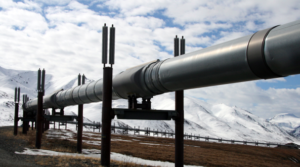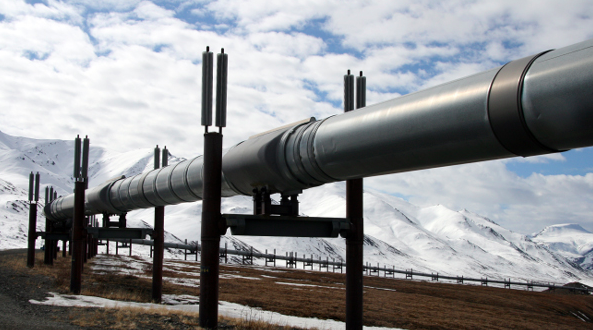
VERSION X – WILL IT CHILL INVESTMENT?
The conference committee on House Bill 111 was scheduled to meet in Juneau today at 3 pm, but the chairs are in Anchorage, while the rest of the committee is in Juneau.
Reps. Geran Tarr and Andy Josephson, who head up the conference committee and are the co-chairs of the House Natural Resources Committee, will be introducing their compromise offer: Version X.
“We are working daily to find compromise with our colleagues in the Senate on this important piece of legislation that is a key component to any successful fiscal plan,” said Rep. Tarr. “We offered up a workable compromise to end the cashable tax credits with the stipulation that lawmakers work over the interim to fix the other flaws in our oil tax system. I remain hopeful our compromise will be accepted. We will see where everyone stands during tomorrow’s meeting.”
No one has seen the “compromise.” They’ve not posted it yet, but rumor in Juneau is that Democrats are asking that the state end what is called the “net operating loss carry forward,” which is the basis for a net tax system.
Their compromise may kill oil investment in Alaska, should it pass the full House and Senate.
“The state would go into a depression,” said one analyst in Juneau, where legislators were eagerly awaiting the still-mysterious Version X. “Investment will dry up. If a company has net operating losses taken away from them, they’ll always have to guess that oil prices will be above their operating costs and capital expenditures. They’ll only invest where there is a guarantee they will make money. That won’t be here.”
With all members of the committee except Tarr and Josephson in Juneau, the 3 pm meeting is not expected to last long. The Legislature’s special session ends on July 15.
Industry leaders described the possible move as “frighteningly chilling for companies large and small — they’ll just put a full desist order on all their Alaska operations and only pull out of the ground what is required of them by law.”
An opinion written by Hal Ingalls, president of Denali Drilling, articulated the concern oil companies have about the gang in charge of the Alaska House of Representatives:
” A compromise to end cash payments to oil companies is on thin ice because of the propaganda perpetuated by Anchorage Representative Les Gara and the politics of the House Democrats. The oil and gas industry has always been Gara’s favorite target, and he’s launched a fresh campaign to hold hostage a compromise on cashable credits that will save Alaska a million dollars per day.
“Rep. Gara and his cohorts are telling Alaskans that the Senate proposal, backed by Gov. Walker, is a sham that simply replaces a credit today with deductions tomorrow, costing the state the same in the long run.
“This is where Gara’s fish tale becomes dangerous misinformation. Cash credits and tax deductions are not the same. Oil companies can only use the tax deductions if they produce oil. We all know that many exploration projects never produce a drop of oil so deductions from those projects will never be applied to an oil company’s state tax bill. In exchange for eliminating these cash credits, the Senate Majority suggests that these explorers be able to deduct their exploration expenses against future profits. Gara calls this a sham.
“Tax structures all over the world allow business to deduct their legitimate operating expenses and they allow companies to apply losses from their bad years against earnings from their profitable years. Gara again calls this a subsidy to the oil companies.
“So why would Rep. Gara push his cohorts in the Democratic House Majority to refuse a compromise that will end these credits? Could it be that he smells the opportunity to slip a significant tax increase into the same bill and skin some more hide off the industry?
“What Rep. Gara does not say is that there is little, if any, company profit left to tax. With oil around $45 per barrel, the state takes 77 percent of the sale value of a barrel of oil; the federal government takes 12 percent, leaving the taxpayer, the oil companies, with 11 percent. In fact, at all oil prices from very low to very high, Alaska takes more from a barrel of oil, than the companies who invest the capital and take the risk. Now Gara wants to raise these taxes again so Alaska gets its “fair share.” That’s ridiculous.
“More oil in the pipeline is critical for Alaska, and we must fix our sights securely on that prize. With higher production come jobs for Alaskans, new money circulating through the economy and tax revenue to the state. New revenues from higher oil production go into the Alaska Permanent Fund, including the annual PFD.
“The current oil tax system works. Alaska is collecting more tax revenue at today’s low prices than we would have under the previous system. Companies are now investing in the North Slope fields, resulting in increased production of three percent in fiscal years 2016 and 2017.
“Gara’s House majority held Alaska hostage all session, demanding an income tax and excessive new taxes on the oil industry in return for passing things they actually agree on, namely: reducing cash credits, passing an operating budget, passing a capital budget and developing a long term fiscal plan.
“Rep. Gara’s rhetoric isn’t new. He’s been at this for years now; he mangles the facts and conjures up sound bites that prey on people’s genuine concerns for children, schools, families and our seniors.
“It’s time to do what’s right for Alaska, to quit playing games with the facts, fix the cash credits problem and pass a capital budget.

Ummm, if these guys want their fare share more than 77%, why don’t they buy out the oil companies and take all the risks and take the lumps as well as the profits
Sounds about right for Gara et al.
Recession, declining population . . . what don’t these people understand about Alaska’s fiscal predicament?
We have a governor who believes that maintaining gov’t is the priority and a Legislature that cannot effect a sustainable budget plan.
The election of 2018 will hopefully restore some degree of sanity. We can replace the gov and some legislators who can’t figure out which party they belong to and others who are simply who have no bearing on reality, fiscal or otherwise.
Comments are closed.